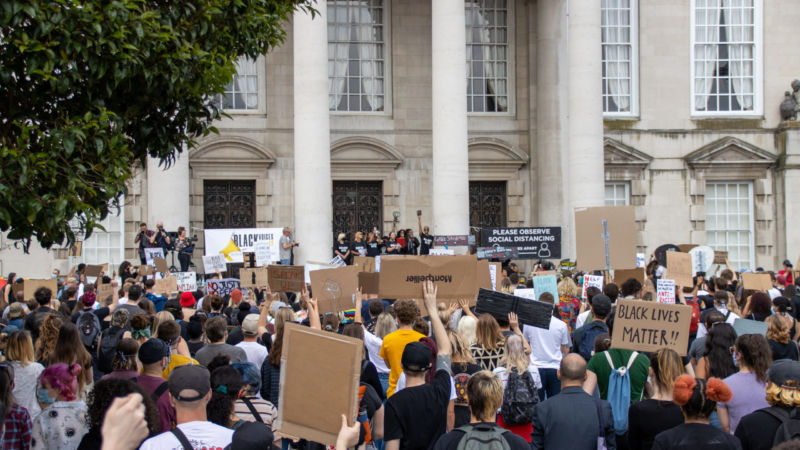A recent virtual panel, hosted by Lawyers in Local Government, gathered to discuss how local governments & the legal industry could address systemic racism
In the wake of the murder of George Floyd, thousands of people marched in the streets around the world and many public statements supporting the Black Lives Matter movement poured out from numerous multinational public and corporate institutions.
It seemed the entire world had been sparked by a new reckoning in the chapter of institutional racism not only in law enforcement but in society at large.
Now, a few months later, the calls for change from people in the streets in the U.K. have quieted. The flows of donations have slowed as there’s been some progress on over policing in Black and Brown communities.
Last month, however, more than 180 people, solicitors, and lawyers in the U.K. gathered virtually during a session hosted by Lawyers in Local Government (LLG) to discuss how individuals working in local governments and the law could address systemic racism.
Speakers from both sides of the Atlantic included Suki Binjal, Director of Legal at the London Borough of Hackney; Rachel McKoy, Head of Commercial & Contracts at the London Borough of Tower Hamlets and Deputy Vice President at LLG; Sharon Sayles Belton, Vice President of Strategic Partnerships and Alliances for Thomson Reuters; and Shamsher Zada, Solicitor for the City of Wolverhampton Council.
Pervasiveness of racism & bias in policing
To start, Zada provided some eye-opening statistics to frame the prevalence of racism in law enforcement. More specifically, he noted that in some areas of the U.K., Black people are 14-times more likely to be stopped and searched and eight-times more likely to be tasered.

Sayles Belton — the former mayor of Minneapolis, where the murder of George Floyd took place — also provided insight on the entrenchment of racism in policing and on some potential solutions. The issue of racism in law enforcement is deeply rooted in the structural racism that permeates our society and its institutions, she said, adding that needed changes include:
Rely less on police to address social problems — In many cities, police are brought in to deal with too many public safety situations that involve failed public policies, such as the growing number of people living on the streets who are mentally ill or chemically dependent. When their presence makes people feel uncomfortable, the police are called. They arrest, jail, and release these people. “It’s a revolving door and a poor use of taxpayer’s funds,” Sayles Belton explained.
Build up public services to address root cause of social issues — In order to reduce reliance on law enforcement, investments in human services need to be made. “Focusing on affordable housing, education, preventative health care (rather than the current model of sick care), and mental health services are key areas that can help address racial disparities and enhance public safety,” she added.
Assume innocence over guilt — Law enforcement should presume innocence first instead of assuming guilt when they are called to deal with a situation, Sayles Belton said. The expectation people have when they call the police is that “the peace” will be restored. “We need to think differently about the culture of policing that leads with the presumption of guilt and culpability. Moreover, violence against Black people by police increases as a result of bias,” she said. “For example, there is a “presumption that I am likely to be aggressive because I’m a black woman… we need to change that.”
Education is a pathway to a brighter future
Even with the shining spots of positive change occurring in Minneapolis, dismantling institutional racism at the societal level requires long-term investment in a variety of areas, especially education. “There are a number of children who are living in poverty, going to bed at night hungry, lacking in health care, and living in unsanitary conditions,” she explained. “And research says that if you start with these disparities, your choices in life are going to be extremely limited.” Indeed, Sayles Belton said she saw this firsthand when she worked as a parole officer, and from that experience, she highlights several critical goals and policy solutions:
-
-
- Early childhood education paired with parental education — Early childhood education and parental support offered together are imperative. Additional investment in the latter is needed for those parents who themselves had poor role models with less-than-ideal parenting skills. “If we want to have healthy children, we need to have informed parents who can effectively advocate for their own children throughout their early years,” Sayles Belton said.
- Literacy by third grade for every child — If children can read by third grade, they are less likely to get involved in activities that could actually disrupt their positive life experiences, she added.
- Build a pipeline to increase the number of teachers of color — Role models for children of color are so important and seeing themselves reflected in positions of influence, such as teachers or school administrators, plays a critical role in influencing what profession children will seek out in adulthood.
-
Reforms in the legal industry
Turning to the prevalence of bias against Black, Asian and minority ethnic (BAME) lawyers and the need to advocate for reforms, Zada noted that BAME solicitors in the U.K. are more likely to be punished by the solicitors’ disciplinary tribunals than white solicitors. Indeed, while only 13% of all solicitors are BAME, 25% of new disciplinary investigations are against BAME solicitors.
These statistics are more troubling because “every organization that I’m familiar with has a diversity policy with a commitment to abide by that policy,” Zada said.
Sayles Belton offered a potential solution in the form of a “citizen review” that allows an independent party to look into these claims of conduct violation and undertake a neutral and impartial review of the conduct that led to the allegations.
Perhaps the most important — albeit, complex — solution to dismantle institutional racism in society is for everyone to make a conscious decision to “understand the bias and then to learn to behave in a manner that doesn’t embrace that bias,” Sayles Belton said.
“We have to take responsibility for addressing our own stuff and the corresponding stereotyping that has been permeated throughout our society, in the media, in literature, and in our daily conversations and conduct.”






